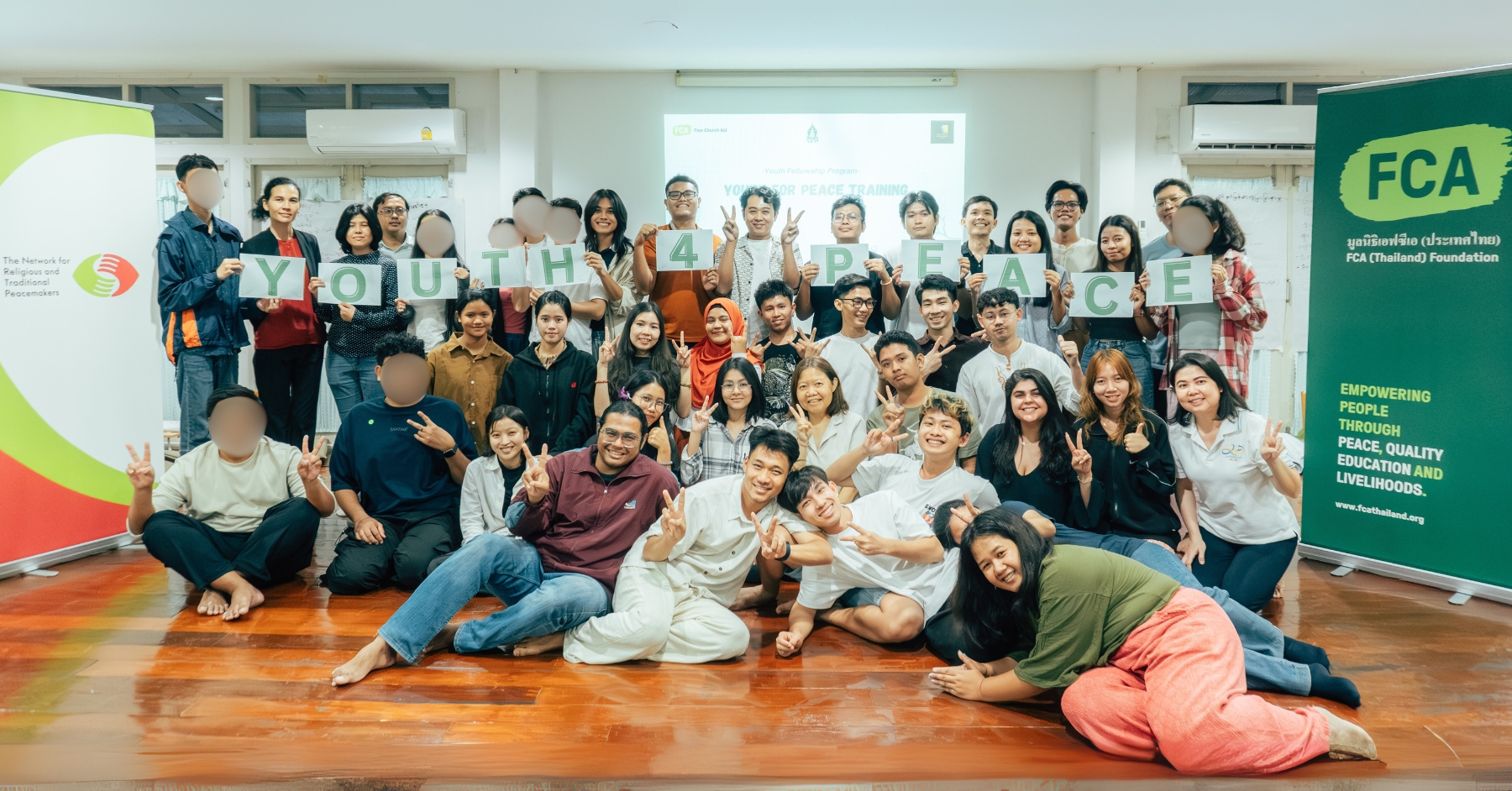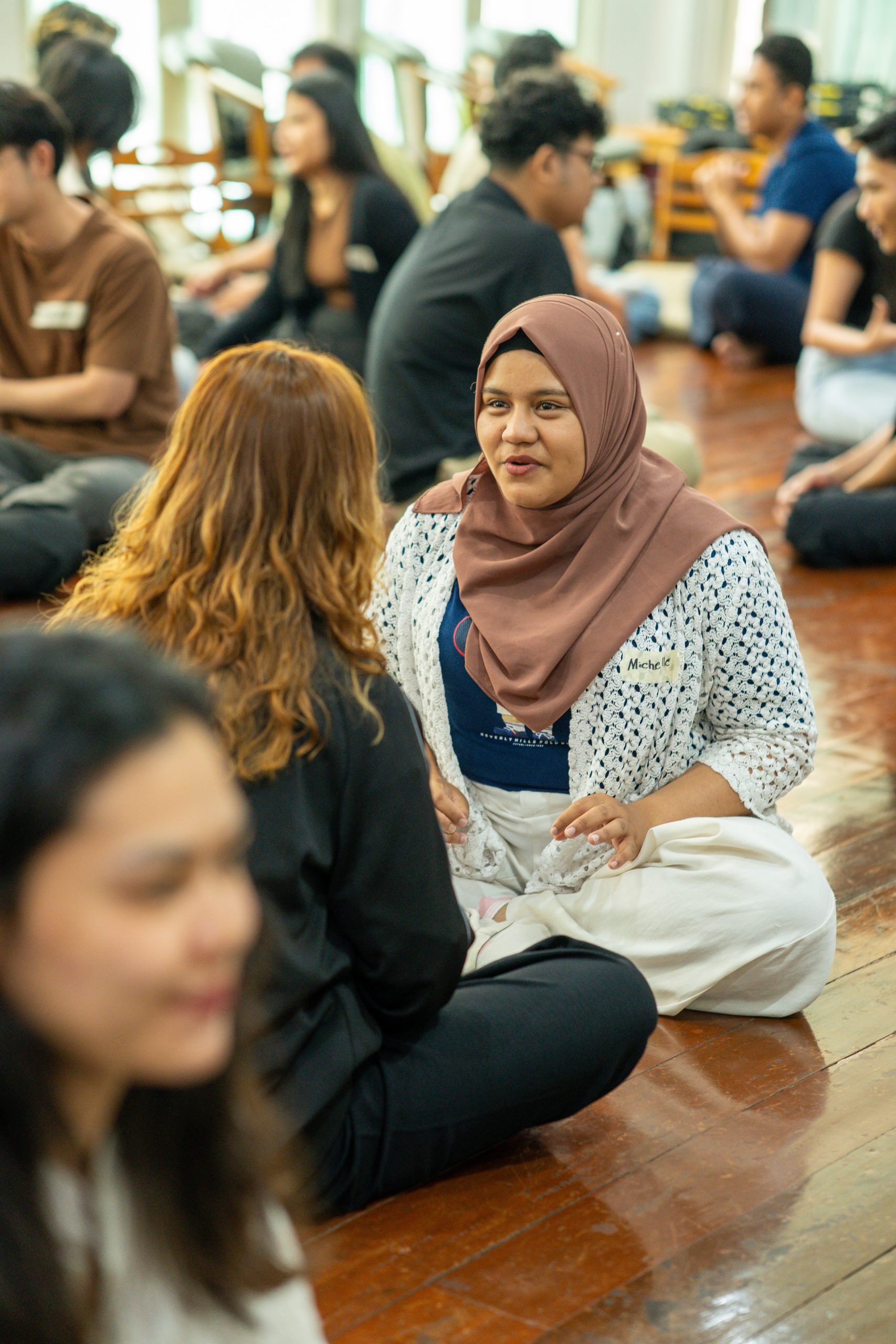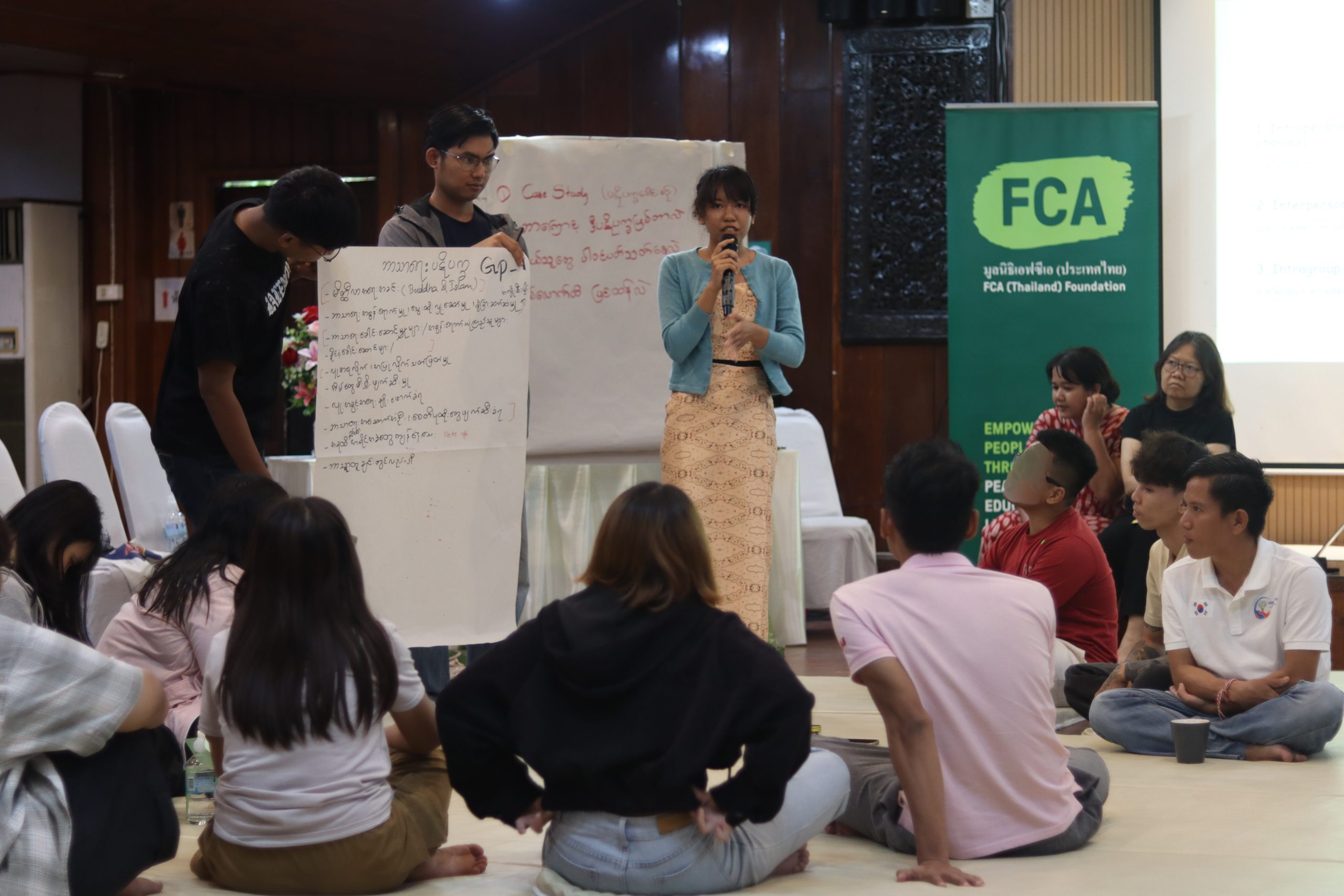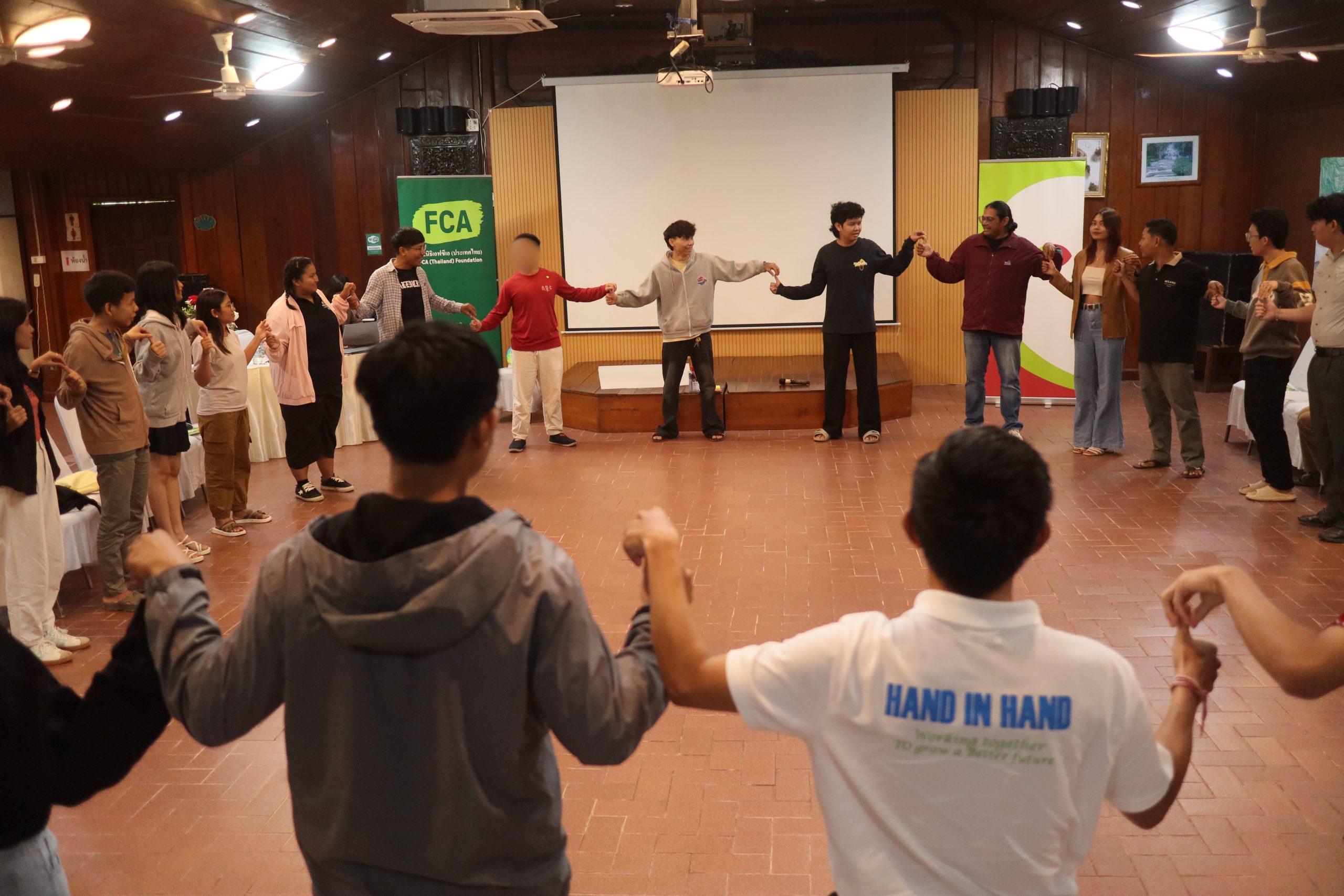Healing Journeys, Rising Voices:
How Myanmar Youth in Thailand are Building Resilient Futures in Thailand
October 2025

From Myanmar to Thailand, young people are learning, healing, and leading with compassion in Bangkok, Thailand. September 2025.
Finding Light Amid Uncertainty
Across Southeast Asia, migration shapes the hopes, challenges, and resilience of millions. For young people from Myanmar, migration is more than a border crossing. It is a crossing between fear and possibility, loss and rebuilding. Ongoing conflict, political repression, and economic collapse since the 2021 coup have uprooted entire communities, with young people forced to flee both internally and across borders. Thailand, with its proximity and relative stability, has become the primary destination for Myanmar youth seeking safety and opportunity. Yet their journeys are filled with barriers—legal restrictions, exploitation, uncertainty, stigma, cultural differences, language barriers, and trauma.
“As a Myanmar youth, I carry trauma from my migration journey. I felt lost for 3 years. But in this safe space, I can share my feelings. Connecting with other Myanmar youths brings me back to life.” –Youth participant, Bangkok
In response to these challenges, the Youth Social Cohesion & Collective Action Fellowship, organized by Finn Church Aid (FCA) Thailand, the Peacemakers Network, and a network of local partners, has provided safe, inclusive spaces where Myanmar youth can learn practical skills, process their experiences, and lead with compassion. The fellowship convened 86 Myanmar youths across three locations in Thailand—Mae Sot, Chiang Mai, and Bangkok—between August and September 2025 to strengthen their resilience, gain essential knowledge, and foster networks of solidarity.
This article explores the experiences of these young people and highlights the transformative power of dialogue, empathy, and leadership.

Youth had a safe space to share and reflect on personal stories, fostering empathy, connection, and mutual understanding with Myanmar peers in Bangkok, Thailand. September 2025.
Why Myanmar Youth Are on the Move
Across Myanmar, conflict and repression have intensified humanitarian needs and protection concerns since 2021. The activation of the People’s Military Service Law in March 2024 accelerated outward migration, with many fleeing forced conscription, insecurity, and poverty. Economic pressures—persistent inflation, rising unemployment, and weakened livelihoods—compound these threats. According to UNDP, estimated 300,000 to 500,000 Myanmar youth (aged 18–35) have migrated abroad.
Thailand, sharing a 2,400-kilometer border with Myanmar, has long been a lifeline. Inflows surged after 2021 and intensified again after conscription was activated in 2024, with 1.3 million entries from Myanmar recorded in 2024 alone according to IOM. Yet irregular entry can trap youth into precarious legal statuses: without recognized documents, work permits, or language proficiency, they struggle to access education, healthcare, resources, and decent work. These vulnerabilities heighten the risks of extortion, exploitation, and psychosocial distress—especially for youth who are navigating adulthood far from their families and communities.
Creating Safe and Inclusive Spaces
The Youth Social Cohesion & Collective Action Fellowship is part of a regional initiative under FCA’s Youth on the Move: A Regional Approach to Resilience project, funded by the Ministry of Foreign Affairs of Finland. This initiative strengthens education and livelihood outcomes by integrating peace education and dialogue, leveraging partnerships with NRTP members and local organizations, to turn conflict dynamics into opportunities for youth engagement, leadership, and regional peacebuilding. It brought together 86 Myanmar youth aged 14–35 from diverse ethnic and religious backgrounds to strengthen their leadership skills, promote peace, and build supportive networks.
FCA Thailand, in collaboration with local partners including the Spirit in Education Movement (SEM), The Space, Human Rights and Development Foundation (HRDF), Myanmar Response Network, Burma Concern, and Thai Volunteer Service (TVS), organized workshops in three locations: Mae Sot, Tak Province (29–31 August 2025), Chiang Mai Province (5–7 September 2025) and Bangkok (19–21 September 2025). Each organization contributed unique expertise—ranging from legal education and workers’ rights to peacebuilding and mindfulness. The aim was practical and holistic to meet immediate safety and legal needs, while nurturing long-term leadership and community resilience.

The fellowship built a leadership role of youth to express their voices towards challenges, aspirations and prospects in Mae Sot, Thailand. August 2025.
Healing Through Connection
Deep listening exercises created structured space for youths to share personal stories while practicing attentive, non-judgmental listening. Revisiting loss, fear, or shame was not easy, but they later described feelings of empathy, pride, and relief—tension giving way to relief, isolation dissolving into connection, and guardedness softening into trust. When youth are given a safe space to process trauma, they are more likely to engage constructively with peers, navigate conflict with perspective, and make informed, compassionate decisions. Beyond individual healing, deep listening also builds group cohesion: it normalizes vulnerability, reduces stigma, and fosters a shared sense of purpose.
“I want to be a psychiatrist to support people with mental health issues. After 2021, many of us suffered trauma while seeking safety in Thailand. Learning mindfulness and deep listening not only helps me heal but gives me tools to help others.” –Youth participant, Mae Sot
Legal Protection in Thailand
Legal literacy is a lifeline. Many Myanmar youths arrive in Thailand with varied documentation but little awareness of their rights, complaint mechanisms, or redress. This lack of knowledge leaves them more vulnerable to unsafe work, rights violations, and trafficking. Through the fellowship, youth gained practical guidance on how their documents determine their rights and duties in Thailand, what to carry, how to file paperwork, and where to seek help. Such clarity enables them to make informed decisions about their work and mobility. Equipping youth with knowledge on basic laws, documentation, safe migration, and legal pathways from Myanmar to Thailand directly reduces their exposure to exploitation while restoring a sense of agency: informed migrants are safer migrants.
“Learning about safe migration, basic laws, and different types of documentation helps us stay safely in Thailand.” –Youth participant, Chiang Mai
Understanding Conflict and Building Peace
The fellowship reframed conflict not as a failure but as a normal part of human interaction that that can drive growth and learning if addressed constructively. Youth explored different scales of conflict—from intrapersonal struggles to systemic discrimination—while practicing skills such as respectful communication, active listening, and mediation. By linking theory to deep listening practice, youth experienced how self-regulation and empathy change the temperature of a conversation. The core insight: peacebuilding starts within—and scales outward through habits of dialogue, fairness, and mutual respect.
“As a youth, I learned that we have a role in building peace. I will start with my inner peace and hope that I can be part of building a peaceful society.” –Youth participant, Bangkok

Myanmar Youth came together to strengthen their resilience, gain essential knowledge, and foster networks of solidarity in Mae Sot, Thailand. August 2025.
Turning Words into Peace Speach
Hate speech was identified as a major driver of social division and violence, particularly in the digital age which misinformation spreads rapidly. Youth learned a concise, powerful framework: hate speech targets identity—religion, ethnicity, gender, disability, sexual orientation—with the intent or effect of dehumanization and harm. Repeated and normalized, it can harden into dangerous speech, especially when amplified by influential speakers and social stressors. The antidote begins with awareness and practice. Youth mapped the slang, idioms, and code words that subtly carry prejudice, and learned to reframe them into “peace speech”—language that affirms dignity, invites dialogue, and cools the temperature of debate. Through practice, participants acknowledged their own biases, reflected on root causes of hate speech rooted in history and education, and recognized their role in preventing escalation of hatred and protecting social cohesion.
“Before, I sometimes used hate speech without thinking. Now I’ve learned how peaceful words can change someone’s feelings and bring more understanding.” –Youth participant, Bangkok
Youth Empowerment and Leadership
The fellowship program centered on a transformative approach to leadership, one that emphasizes values rather than mere authority. Youth explored essential principles such as empathy, inclusivity, and collaboration, which serve as the foundation for effective leadership. Through interactive discussions, youth engaged with various leadership styles—such as servant, democratic, and transformational leadership—gaining insight into the different ways leaders can inspire and motivate individuals to work together towards shared objectives. As part of their learning journey, youth were encouraged to reflect on their own experiences and identify their unique strengths as advocates for change. They discovered that advocacy could take many forms, from organizing community events, to volunteer services, and dialogues. The fellowship not only equipped them with practical skills but also instilled a sense of agency, empowering them to take initiative and drive meaningful change in their own communities.
“Before I joined the workshop, I doubted myself what I could do. Here, I was inspired by new friends and their stories. They encouraged me to keep going and to help others in society.” –Youth participant, Chiang Mai
Youth Leading with Healing, Courage, and Hope
Migration often begins in crisis—but it doesn’t have to end there. It is more than movement—but survival, identity, and hope. The journey is marked by trauma and uncertainty, yet the Youth Social Cohesion & Collective Action Fellowship shows what’s possible when safe spaces, legal knowledge, and leadership skills converge. Myanmar youth stepped into their stories and discovered something vital together. By strengthening practical agencies, they are rebuilding their lives while knitting together more compassionate, resilient communities. Together, we can ensure Myanmar youth on the move are not defined by displacement, but empowered as leaders of peace, resilience, and change.
“I found peace here. I was grateful for this opportunity to connect with new friends. I feel that I’m not alone as I have friends and others to support my journey.” –Youth participant, Mae Sot
Follow the Peacemakers Network on social
